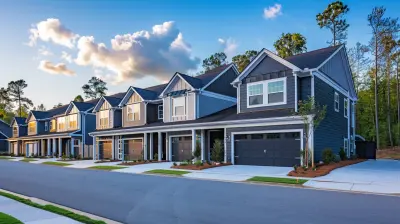How School Districts Impact Your House Hunting Decisions
18 July 2025
Let’s face it—house hunting isn't just about square footage, granite countertops, and whether or not the backyard has enough space for your dog to run wild. One key factor that often flies under the radar for many first-time buyers (but shouldn't!) is the school district. Yep, whether you have kids or not, the local school district can seriously influence your real estate choices in ways you might not expect.
So, grab your coffee and let’s dive into how school districts impact your house hunting decisions—because this isn't a detail you want to overlook.
Why School Districts Are Such a Big Deal in Real Estate
You’re probably wondering, “If I don’t have kids, why should I care about the school district?” Fair question. But here’s the thing: school districts affect way more than just your child’s education. They directly tie into home values, neighborhood stability, and even how quickly your home will sell in the future.Think of a school district as the heart of a neighborhood—the stronger the heart, the more life and value it pumps into the area.
Property Values Tend to Be Higher in Top-Rated School Districts
Let’s talk numbers.Homes located in highly-rated school districts typically have higher property values. That’s not just a coincidence. Parents are willing to pay a premium for their children’s education, and that demand drives prices up. In fact, a home in a top-rated district can cost anywhere from 10% to 30% more than a similar home in a less desirable district.
Money talks, right? And in real estate, it’s always whispering, “Location, location, location…oh, and good schools.”
Better School Districts Make Homes Easier to Sell
Imagine two nearly identical houses. One's in a top-tier school district. The other? Not so much.Guess which one will fly off the market?
That's right. Homes in great school zones tend to sell faster. Even if buyers don’t have kids, they know the value those schools add. It’s like buying into a premium membership club—you might not need all the perks right now, but you’re happy knowing you have them.
Long-Term Investment: School Districts Hold Value Over Time
Markets fluctuate, interest rates go up and down, trends come and go. But school quality? That tends to remain a stable value driver.Good schools don’t just pop up overnight. They’re built over years by strong communities, consistent funding, and committed educators. That kind of reputation sticks, which means homes in those areas stand strong even during economic slumps.
In plain terms: buying in a good school district is like putting your money in a slow-and-steady stock. It might not always be flashy, but it’s reliable.
Renters Care, Too—Making It Great for Investors
Thinking of getting into rental properties? School districts matter here, too.Families who rent often prioritize proximity to great schools just as much as buyers do. That means if you own a rental property in a strong district, you can usually charge higher rent and keep vacancy rates low. It's a win-win.
So, whether you’re buying your forever home or dipping your toes into real estate investment, school districts offer long-term perks.
School Ranking Systems: What Do They Even Mean?
Okay, so you’ve heard of “GreatSchools” or maybe “Niche” or “SchoolDigger.” But what are these sites actually measuring when they throw around ratings like “9/10” or “A+”?Typically, these ratings are based on:
- Standardized test scores
- Graduation rates
- Student-teacher ratios
- Parent and student reviews
- College readiness metrics
But here’s a word of caution: Don’t just rely on a number. Visit the schools. Talk to other parents. Remember, just like you wouldn’t buy a house without seeing it, you shouldn’t judge a school by one online rating.
Not All School Districts Are Created Equal
It’s not just about the district—it’s about the specific school.Some school districts are massive, covering multiple neighborhoods, with schools that vary widely in performance. Just because a district is “decent” doesn’t mean every school within it is too. The keyword here? Research.
Use district maps, zoning data, and school boundary tools to find out exactly which schools serve a specific address. It might surprise you how quickly things can change from one street to the next.
Balancing Budget and School Quality
Let’s not sugarcoat it: buying in a top-rated school district often means higher price tags. But that doesn’t mean you have to max out your budget to get decent schools.Many up-and-coming areas are investing heavily in education, hiring great teachers, and upgrading facilities. Look for districts on the rise. It’s kind of like buying a stock before it hits mainstream attention—huge potential at a more affordable price.
And hey, working with a knowledgeable real estate agent (who knows the local school scene) can pay off big time here.
Don’t Have Kids? Here’s Why You Should Still Care
Still thinking, “But I don’t even have kids!”? Listen up.Homes in great school districts are in constant demand. When it’s time to sell, you’ll have no shortage of buyers. It’s a market advantage, plain and simple.
Kind of like buying beachfront property—even if you never swim, you know everyone else wants to. That desirability boosts your investment.
So, even if kids aren’t part of your current plan, your future self (and bank account) will thank you for paying attention to the school district now.
The Trade-Offs: What Are You Willing to Compromise?
Every homebuyer has to juggle priorities—location, size, amenities, commute time, and yes, school quality.Sometimes, the trade-off means buying a smaller home in a better school zone... or a bigger home in a district that’s just average. It all comes down to what’s most important to you.
Make a list. Decide what you're willing to be flexible on. But always keep an eye on future resale value—because even if it’s not a priority today, it could be a lifeline down the road.
Questions to Ask Your Realtor About School Districts
Chances are, your real estate agent has heard every school-related question under the sun. Don’t be shy—ask everything you need to know.Here are some starters:
- What are the best school districts in this area?
- Are the school boundaries likely to change?
- Are there any upcoming developments that could affect the schools?
- How do local schools compare with others in nearby neighborhoods?
A great agent will have more than just textbook answers. They’ll know the vibe of each district, the local buzz, and which schools are up-and-coming.
Final Thoughts: Let School Districts Guide, Not Rule, Your Decisions
Look, we won’t say that school districts should be the only factor in your house hunt—but they should definitely be at the top of your list. Whether you have kids, plan to in the future, or just want a smart investment, the school district can make or break the long-term value of your home.So treat it like you would any big decision: do your homework, trust your instincts, and think long-term.
After all, buying a home is about planting roots—and it makes sense to plant them somewhere that nurtures growth, learning, and community.
all images in this post were generated using AI tools
Category:
House HuntingAuthor:

Vincent Clayton
Discussion
rate this article
1 comments
Zyana Bishop
Interesting perspective! How do varying school ratings influence home values in different neighborhoods? Curious to see more statistics!
July 29, 2025 at 2:27 AM

Vincent Clayton
Thank you for your interest! Generally, higher school ratings often lead to increased home values, as families prioritize education. Specific statistics can vary by region, but homes in top-rated school districts typically see a premium of 10-20% compared to lower-rated areas. Let me know if you’d like more detailed data!


